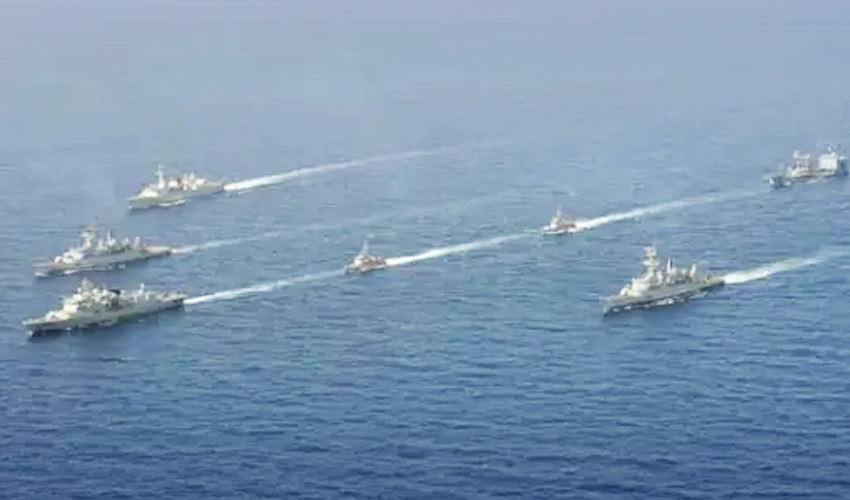The International Maritime Organization (IMO) has been commemorating World Maritime Day (WMD) since 1978 to emphasize the significance of the maritime domain and its contribution in development of modern world.
Across the globe, events and activities are organized to highlight critical maritime affairs like maritime security, maritime trade, marine environment protection etc. The day also serves as a platform for governments, maritime industries and organizations, academic and scientific community, and public segments to share knowledge, and work in collaboration for improving the efficiency and safety of maritime sector.
Oceans envelop more than 70% of planet surface and have shaped modern world by serving as medium of connectivity. With more than 80% share in global trade, ships have played significant role in shaping globalization. According to a report published by Statista in 2022, titled ‘Number of ships in merchant fleet’, more than 58,000 merchant ships are trading internationally.
The shipping industry runs the global economy. However in parallel, its environmental footprint cannot be ignored at all. On average, shipping vessels release more than one billion metric tons of carbon and other pollutants into the atmosphere every year.
In total, greenhouse emissions by shipping industry are almost 3% of global emissions, according to the Statista report. At casual glace, this figure appears relatively low considering the volume of trade conducted by ships.
However, when put into context that if global shipping industry was a country it would have ranked sixth-largest producer of green-house gases, the true scale of shipping pollution can be understood.
Beside emissions, ships pollute marine environment through various other means. Oil spills from ship accidents are particularly damaging, causing harm to marine life and coastal ecosystems.
Ballast water, taken on by ships for stability, can inadvertently introduce invasive species when discharged into new marine environments, disrupting local ecosystems. Similarly, inadequate garbage disposal, sewage discharge, and the use of toxic antifouling paints further contribute to ocean pollution.
In a nutshell, ships contribute to ocean pollution from variety of mediums and effective measures are required to minimize the destructive footprint of modern shipping.
In this regard, this year’s theme, ‘MARPOL at 50 - our commitment goes on’, marks the 50th anniversary of the International Convention for the Prevention of Pollution from Ships (MARPOL).
MARPOL is a crucial international treaty overseen by the IMO. Its primary purpose is to combat pollution generated by ships and safeguard the marine environment. The theme underscores the organization’s historical efforts for protecting the marine environment from destructive impact of shipping industry through comprehensive regulatory framework.
In concept, the theme highlights the problem of ship-borne pollution, and emphasizes on undertaking collaborative measures for overcoming it. Given that the theme focuses on industry innovation, climate action, the preservation of marine life, and collaborative partnerships for goal attainment, it is closely aligned with the United Nations Sustainable Development Goals (SDGs), specifically SDG-09, SDG-13, SDG-14, and SDG-17, respectively.
The MARPOL Convention, initially adopted on November 2, 1973, at the International Maritime Organization (IMO), underwent a significant development in response to a series of tanker accidents occurring in 1976-77. At that time, the 1973 MARPOL Convention had not yet become effective, so the 1978 MARPOL Protocol effectively absorbed and consolidated the provisions of the original Convention. This combined instrument became legally binding on October 2, 1983. Over the years, MARPOL has continued to evolve through various amendments, stated the Statista report.
MARPOL comprises various annexes that address different forms of pollution and set forth regulations for ship operations to prevent and mitigate environmental pollution.
MARPOL Annex I aims to reduce the risk of oil spills during marine activities by imposing regulations on oil tanker construction, equipment, and operational procedures for preventing oil pollution from ships.
Annex II pertains to the control of pollution by harmful liquid substances carried in bulk and establishes guidelines for the discharge of hazardous chemicals. Annex III addresses the safe carriage and discharge of packaged harmful substances, such as industrial chemicals.
Annex IV tackles sewage pollution from ships by setting standards for sewage treatment systems. Annex V deals with garbage pollution by regulating waste disposal practices on vessels. Lastly, Annex VI targets air pollution from ship emissions, imposing limits on sulfur and nitrogen oxides and encouraging the use of cleaner fuels and energy-efficient ship designs, the report reflects.
As the significance of MARPOL will be reflected on this World Maritime Day, there is need to acknowledge its role in shaping the maritime industry's commitment to undertake responsible and environmental friendly practices for sustaining and safeguarding marine environment.
The maritime community must remain steadfast in its dedication to reducing its environmental footprint. This means continued investment in research and development, the implementation of cutting-edge technologies, and the enforcement of rigorous regulations. It means fostering a culture of sustainability and responsibility within the governments and shipping industry, where all shipping vessels and every crew member understands their role in protecting our oceans and henceforth, progression of modern human civilization.


























